“It healed my soul.”
Helen received her AMI primary diploma from the Montessori Training and Research Trust (MTRT), Hyderabad. Since then she has worked with the trust and has assisted on several Montessori Training Courses. She was the local coordinator for the 2016 EsF Assembly in Hyderabad, which inspired her to set up initiatives to bring Montessori education to more children in rural and under-resourced areas in India. She is currently following the AMI elementary training as well.
The second interview in our new series explores a deeply personal story of self-discovery and sense of purpose. Enjoy this compelling read!
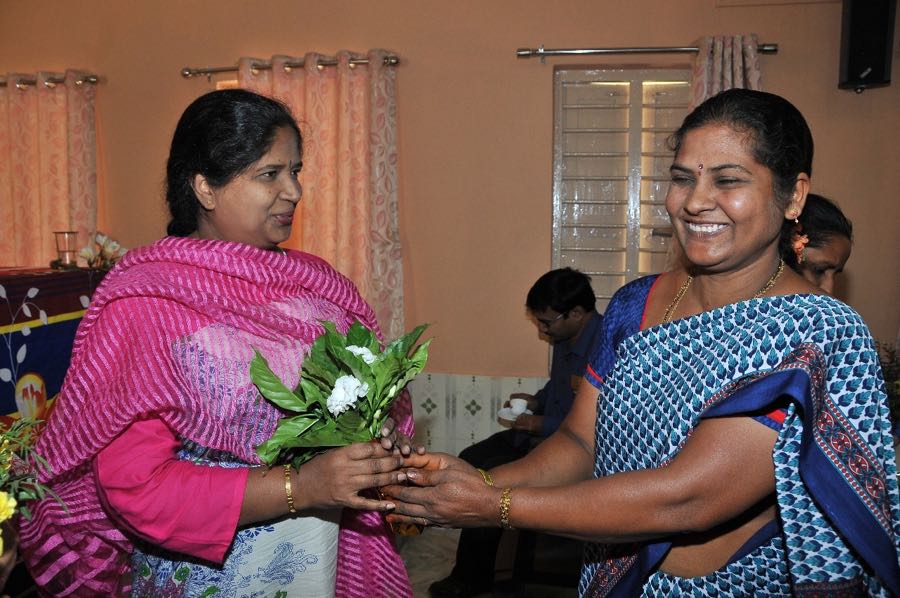
Where in the world did you grow up, Helen?
I grew up in a small town called Kolar Gold field – KGF, in south India, 90 km away from Bangalore in Karnataka.
I am a Tamilian basically belonging to another state; my grandparents migrated to KGF to work in the gold mines in Karnataka. My father also started his career working in the gold mines but later shifted to BEML (Bharath Earth Movers Limited), another company in KGF.
This town was created by the British military officers on a discarded virgin land. In 1875, when the mining company expanded, a grand township was born and grew to earn the title “The Little England.” The “Britishers” brought plants from England that suited the climate of this region, which is comparatively cooler than the rest of the region due to its elevation. The roads in our town were very well laid, and were complemented by an abundance of flowering plants and trees. This included trees of varieties of fruits and nuts like coconut, guava, mango, cashew, jackfruit, gooseberry and avocado, to name a few. We never bought fruits from the market. We had enough trees all around us. We lived very close to nature. This is the place in which I was born and grew up.
Can you describe one of your most precious childhood memories?
My most enchanting memory is when I went for a picnic with a group of children, which we did very often to nearby villages. I saw a villager making bricks one day. I sat and watched that person and I was fascinated by the way in which he was working. After a while I asked him if I could make some bricks, too. He let me do it and I made lots of bricks for him all afternoon. I was very happy about that and I had lots of stories about this brickmaker to tell my mother and father when I went home. Even now when I am narrating this to you, I am feeling the same kind of happiness. Every time I go on a picnic, I relive this memory.
What do you remember about your earliest school days?
I remember my first day of school would’ve been around 5 years of age, going on a bicycle with my grandfather. I remember the bench I sat on and kept looking out of the class at him all the time. He sat far away from my class under a tree with his cycle. I also remember that I ran to him as soon as the school bell rang. I still remember my first class teacher who had a smile on her face, though did shout when she was angry, but it is only her smiling face that is etched in my memory.
My earliest school days were carefree. Going to school was fun, I looked forward to going to school every day. It was a happy place. I can even say it was blissful. I don’t remember burning the midnight oil to prepare for exams not even to write my homework. I did not know all these efforts were even required. I did only as much as I was asked to do, unlike the current day school situation where only working hard and for long hours has become equivalent to evidence of learning.
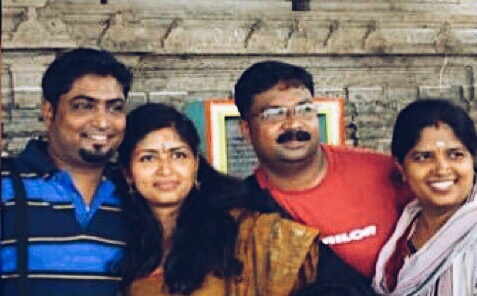
Did one person, in particular, inspire you during your childhood?
The one person that inspired me the most during my childhood was my father, B. Arokia Dass. He was gentle, humble and a good human being. He was a very selfless person. As an adult I use the word “selfless” but how did I know this as a child? I saw my father live his message. I have seen my father go out of his way to help people.
One morning I woke up to sweep the front yard, as that was my duty, and after I completed the task my father came and asked me if I had finished. I said “Yes.” He did not agree, as I had only swept our own yard and not also the other yards in our row of houses. Another time, I saw my father give away his new shirt when someone complimented it. He was a sincere and committed person. I don’t remember him ever sitting idle at home any day; he went to work every single day. Sun or rain did not stop him from going to work. I have sometimes seen him come late from work but never go late to work. He worked till the last day he lived on this earth. I never heard him speak negatively of any food that was served to him. He said his grace and ate every meal with gratitude. Even if grains spilled from his plate, he would pick them up and eat them. Nowadays we have to explain to our children how our food is grown and the process that foods must travel from the farm to our table, including the hard work of the people who make this possible. This never had to be explained to us. As children, all four of us siblings absorbed my father’s attitudes towards life. I see all these qualities in my brothers and sister now.
How does your childhood experience relate to the life you are currently living?
I had a pleasant childhood, which has laid a strong foundation for the contented life that I am presently living. Values got from the home environment of selfless living and concern for the wellbeing of others are very evident in my current life. I want to create a happy environment for children that would be similar to the kind of childhood I enjoyed, and the Montessori philosophy supports me in doing this as it follows the natural laws of the true nature of the child. I derive the same kind of satisfaction, contentment and joy that I got as a child during my picnics to the village in the EsF work that I do now with the Aanganwadi teachers of the villages! Life is a circle, I feel I have found my bearings now. My work is also giving me an opportunity to relive my childhood.
How did Montessori happen in your life, Helen?
After I got married and moved to Hyderabad, a very big city compared to the small town I came from, I felt lost, insecure, unsafe and very unhappy: I had no friends, no relatives and also had to learn a new language for I moved into another state. It took me a very long time to begin to feel comfortable. I still tell people that I don’t belong here. Finally, after two years when my daughter was born, she brought new life in me and my whole life revolved around her till she started going to school.
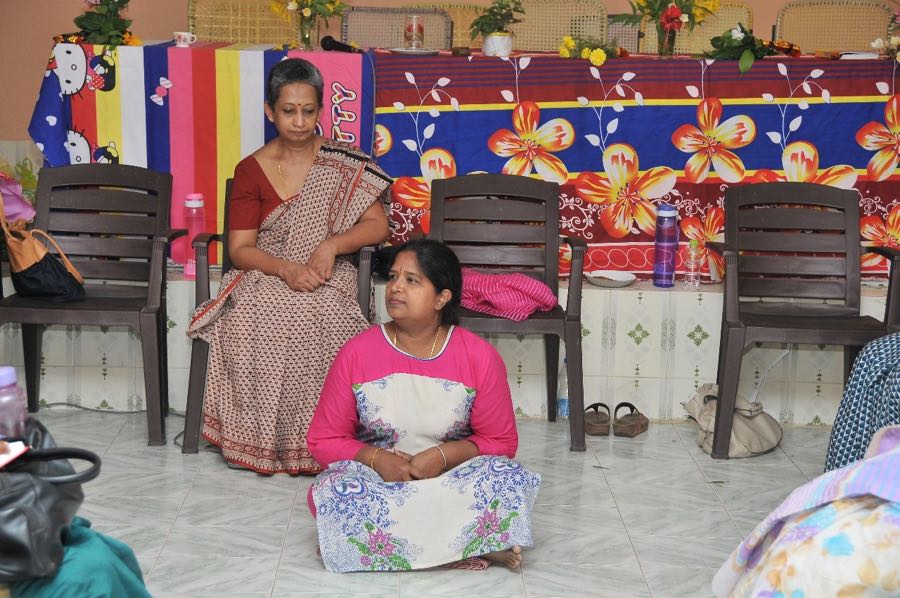
This time loneliness came back with greater intensity for by now I had lost my second daughter who lived for close to two months and also had just lost my father who was very dear to me and I was shattered. I couldn’t bear to see my daughter go inside the school, I used to feel very insecure and so waited outside the gate for the whole morning. She was the only person I could relate to in Hyderabad; she seemed like my only friend. After some time continuing this routine, the school principal came out to me and said “I’ve seen you stand outside. Why don’t you come inside and work?” I did that but was constantly following my daughter, which she did not want. This was noticed by my daughter’s class teacher, a trained Montessorian. She realized that I needed help, not just for myself but to also understand that my little girl required space in which to grow and she immediately enrolled me in the Montessori training course at the Montessori Training and Research Trust under the AMI Director of Training Mrs Lakshmi Krishnakumar. This was a life-changing experience; the philosophy touched my soul… it healed my depression and dispelled my insecurities. The whole programme was therapeutic and gave me a second lease of a meaningful life. This healing process continued for many more years, as I assisted on Mrs Lakshmi Krishnakumar’s primary courses.
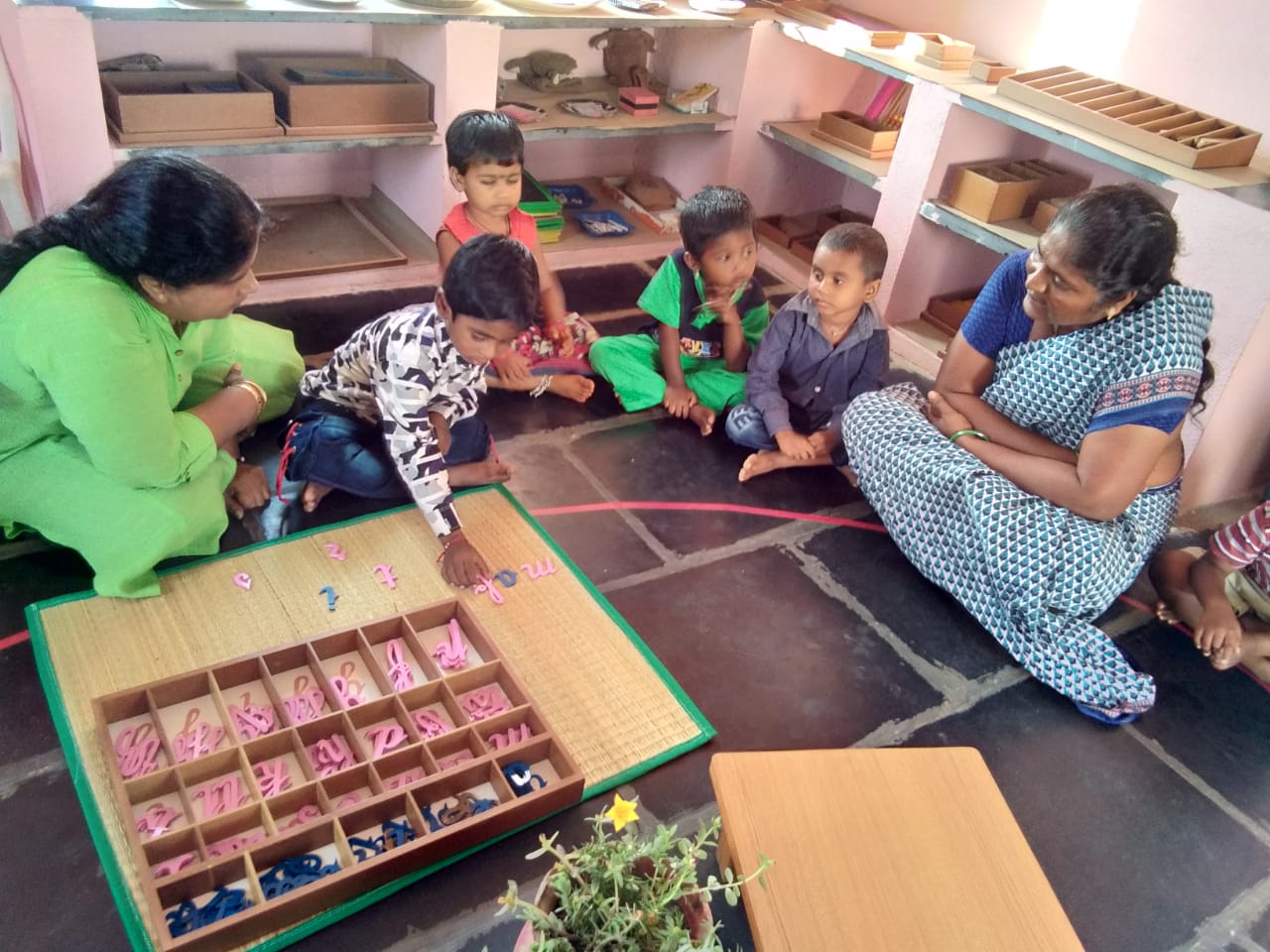
What has been a highlight of your Montessori experience?
A highlight of my own Montessori experience was coordinating the 2016 EsF Assembly in Hyderabad. This Assembly reminded me that there is a lot more work to do on behalf of children and marginalized communities. I heard from a girl who started a Montessori school on a boat, which travels among islands every day to collect children. Imagine… a floating classroom! Many such inspiring stories were shared in the assembly. Educateurs Sans Frontières actually shook me and encouraged me to come out of my comfort zone and explore something different. It encouraged me to think out of the box, I have been lucky to spend time with many other inspirational educators and am engaged in exciting projects that can literally change lives through the provision of basic life skills.
After the assembly, many opportunities came my way and two most important of them where work with the Telangana Minority Residential Educational Schools (TMREIS) and the Aanganwadies (rural child care centres) of Guntur district Andhra Pradesh. The Chief Minister of Telangana adopted one orphanage in Hyderabad under TMREIS and sought the support of EsF Hyderabad to create Montessori environment for the children. In the beginning, the children gave a tough time. Working with them was not easy. Many teachers and helpers did not come back to work. Now, after close to two years of implementing Montessori practices, the team is very happy with the way the children are happy and settled. Some of the changes that were noticed are children are that they are less unruly, they follow instructions, they are clean, they are eager to learn new concepts, they are hungry for knowledge. Now that they are sure that their next meal is guaranteed their exuberant eating style has come down. Also, their mannerism in terms of body language and spoken language is refined. After seeing the changes in these children, TMREIS have plans to adopt many more orphanages and set up Montessori environments for them. They also have plans to have one prepared environment in each of their 205 centers. A detailed inspiring record of this programme can be found on the EsF website.
The other EsF work that was taken up was an initiative for the Aanganwadi centers. To take Montessori principles and practices to diverse communities and to reach as many children as possible at the grass root level in a simple and accessible way, EsF Hyderabad developed a set of low-cost materials and a training module named Community Rooted Education (CoRE). The focus of CoRE is to prepare the adult and the environment and use the materials to aid the children in their development. A pilot initiative to train Aanganwadi workers in Thullur Mandal, Guntur, Andhra Pradesh is in progress. As part of CoRE, 55 Aanganwadi teachers were given training for 10 days followed by 2 days mentoring every month. After 1,5 years of work in the Aanganwadies, 9 centers have been set up. The teachers can now follow English to an extent. They also expressed that they knew what to do all these years, but now they are confident and happy that they know how to do it. After setting up the environment with the Montessori material, more children are coming to the centers now. The number of children has increased from about 12 to 32. Also, the community is involved and committed to supporting the centers on a daily basis. The initiatives are in the process of sustainable implementation and scaling up. There are many more initiatives in the pipeline. I am excited and looking forward to all our dreams take wings and soar one by one!
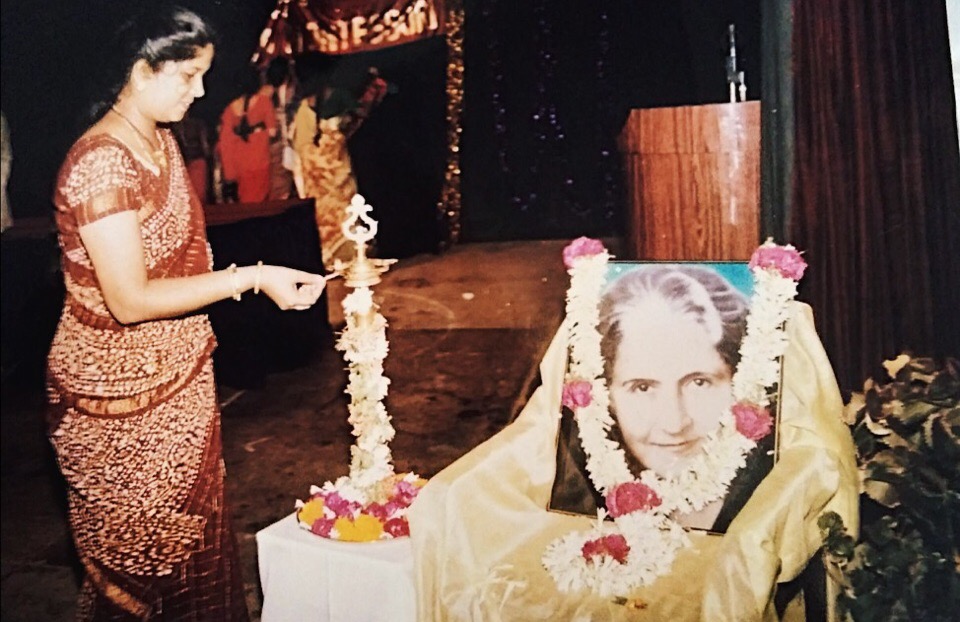
Lighting a lamp on Dr Montessori’s Birth Anniversary, to the person who lit my life with brightness and made it meaningful and showed me a path to travel in this journey called life.
– Helen Mohan Elias
We are immensely grateful to Helen for sharing her unique story. Learn more about the India initiatives here.

